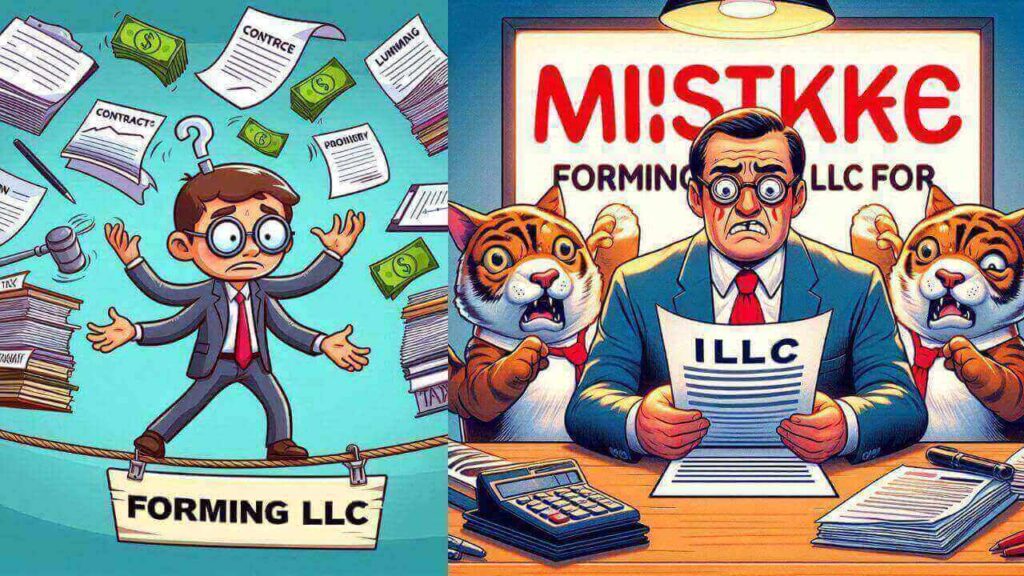
When starting an LLC, it’s essential to avoid common mistakes that can impact your business. Here are some key pitfalls to steer clear of:
1. Not Declaring a Business Entity:
As a new business owner, it’s crucial to register your business as an entity. This not only determines how your business is taxed but also affects your exposure to risks. Without proper registration, you might unknowingly expose your company to more liability than expected.
Let me break down the key points for you:
Registering Your Business as an Entity:
When you start a business, you have the option to register it as a legal entity. Common types of business entities include sole proprietorships, partnerships, corporations, and limited liability companies (LLCs).
Registering your business as an entity provides several benefits:
Legal Separation: By creating a separate legal entity, you establish a clear distinction between your personal assets and your business assets. This separation helps protect your personal assets (such as your home, car, or savings) from business-related liabilities.
Limited Liability: If you choose an LLC or corporation, you enjoy limited liability. This means that your personal assets are generally shielded from business debts, lawsuits, and other financial obligations incurred by the company.
Tax Implications: Different business entities have varying tax treatment. For example:
- Sole Proprietorship: You report business income and expenses on your personal tax return (Form 1040). There’s no separate tax entity for the business.
- LLC: An LLC can be taxed as a sole proprietorship, partnership, or corporation. You can choose the most advantageous tax structure for your situation.
- Corporation: Corporations are separate tax entities, and their profits are subject to corporate income tax. Shareholders (owners) pay taxes on dividends received.
Proper registration ensures that your business is recognized by the government and operates within legal boundaries.
Tax Implications:
The choice of business entity affects how your business income is taxed:
- Pass-Through Entities: LLCs and partnerships are pass-through entities. This means that business profits and losses flow through to the owners’ personal tax returns. You pay taxes on your share of the income.
- Corporations: Corporations pay corporate income tax, and shareholders pay taxes on dividends received. This double taxation can be a disadvantage.
Consider consulting a tax professional to determine the most tax-efficient structure for your business.
Exposure to Risks:
Operating without proper registration exposes your business to risks:
- Personal Liability: If you don’t create a legal entity, you remain personally liable for business debts and legal claims. Creditors can go after your personal assets.
- Legal Disputes: Without clear legal documentation (such as an operating agreement for an LLC), disputes among business partners can escalate.
- Lack of Credibility: Proper registration lends credibility to your business. Customers, suppliers, and investors prefer dealing with registered entities.
- Compliance Issues: Unregistered businesses may inadvertently violate local, state, or federal regulations, leading to penalties.
In summary, registering your business as an entity not only affects taxation but also shields you from personal liability and ensures legal compliance. It’s a critical step for any new business owner. 🌟
2. Choosing the Wrong Entity Type:
While learning how to start an LLC, some business owners mistakenly opt for an LLC when another entity structure might be more suitable. Consider factors like tax filing, asset separation, and decision-making authority. Consulting a tax expert or lawyer can help you make an informed decision.
Choosing the Right Entity Structure:
When starting a business, selecting the appropriate legal entity structure is crucial. An LLC (Limited Liability Company) is just one option among several.
Common Business Entity Types:
- LLC (Limited Liability Company): An LLC provides limited liability protection for its owners (referred to as “members”). It combines features of a corporation and a partnership. Members are shielded from personal liability for business debts and legal claims.
- Corporation: Corporations are separate legal entities from their owners. They offer strong liability protection but have more complex formalities and tax requirements.
- Sole Proprietorship: A sole proprietorship is the simplest form of business. The owner and the business are considered the same legal entity. However, there’s no liability protection.
- Partnership: Partnerships involve two or more individuals sharing ownership. There are general partnerships (with unlimited liability) and limited partnerships (with limited liability for some partners).
Factors to Consider:
- Tax Implications: Different structures have varying tax treatments. Consider how profits and losses are distributed and taxed.
- Liability Protection: Evaluate how much personal liability exposure you’re comfortable with. LLCs and corporations offer better protection than sole proprietorships.
- Decision-Making Authority: In an LLC, members typically have more control over decision-making than in a corporation.
- Asset Separation: Consider whether you want a clear separation between personal and business assets.
Mistakes to Avoid:
- Some business owners mistakenly choose an LLC without fully understanding the implications. For example, if you need to raise capital through investors, a corporation might be a better fit.
- Consulting Professionals: Seeking advice from a tax expert or lawyer is essential. They can guide you based on your specific circumstances and goals.
Consulting a Tax Expert or Lawyer:
Why?: Making an informed decision requires understanding the legal and financial implications. A professional can help you navigate the complexities.
What They Can Assist With:
- Entity Selection: They’ll assess your business needs, risk tolerance, and long-term goals to recommend the most suitable structure.
- Tax Planning: They’ll guide you on minimizing tax liability and complying with tax laws.
- Legal Compliance: Professionals ensure you meet all legal requirements during formation and ongoing operations.
- Customization: They can tailor advice to your unique situation.
In summary, don’t rush into choosing an LLC. Consider all relevant factors, seek professional advice, and make an informed decision that aligns with your business objectives. 🌟
3. Skipping the Operating Agreement:
An operating agreement outlines the rules and responsibilities within your LLC. Skipping this step can lead to confusion and disputes among members. Ensure you draft a comprehensive operating agreement.
Here’s an explanation of the importance of an operating agreement for an LLC:
Operating Agreement Defined:
- An operating agreement is a legal document that outlines the governance and operational guidelines of a Limited Liability Company (LLC).
- It details the rights, powers, duties, liabilities, and obligations of the members (owners) and managers.
Purpose of an Operating Agreement:
- Clarifies Rules: It specifies how the LLC will be run, including profit sharing, ownership percentages, and management structure.
- Prevents Misunderstandings: By clearly defining member responsibilities and procedures, it reduces the potential for disputes.
- Protects LLC Status: It reinforces the separation between the members and the business, which is essential for maintaining limited liability protection.
Risks of Not Having One:
- Confusion: Without an operating agreement, members may be uncertain about their roles and responsibilities.
- Disputes: Ambiguity can lead to disagreements among members, potentially disrupting business operations.
- Default Rules Apply: In the absence of an operating agreement, state default rules govern the LLC, which may not align with the members’ intentions.
Best Practices:
- Draft Carefully: Create a comprehensive operating agreement tailored to your LLC’s specific needs.
- Legal Assistance: Consider consulting with an attorney to ensure that the agreement is thorough and legally sound.
In essence, an operating agreement is vital for the smooth operation and legal integrity of an LLC. It’s a key document that should not be overlooked. 🌟
4. Neglecting Compliance Requirements:
Failing to comply with state and local requirements can result in penalties or legal issues. Stay informed about filing deadlines, annual reports, and other obligations.
Let’s delve into the importance of compliance with state and local requirements for your business:
Penalties and Legal Issues:
- Penalties: Non-compliance can lead to fines, penalties, or legal consequences. These can significantly impact your business’s finances and reputation.
- Legal Issues: Ignoring requirements may result in lawsuits, regulatory investigations, or even the dissolution of your business.
Key Areas of Compliance:
- Filing Deadlines: Each state has specific deadlines for filing documents related to your business formation, such as Articles of Organization (for LLCs) or Articles of Incorporation (for corporations). Missing these deadlines can have repercussions.
- Annual Reports: Most states require LLCs and corporations to file annual reports. These reports update essential information about your business, including ownership details and contact information.
- Business Licenses and Permits: Depending on your location and industry, you may need licenses or permits to operate legally. Failure to obtain these can lead to fines or business closure.
- Tax Compliance: Pay attention to state and local tax obligations. This includes sales tax, income tax, and payroll tax. Incorrect filings can result in penalties.
- Zoning and Land Use Regulations: Comply with local zoning laws to avoid conflicts with neighbors or authorities.
- Employment Laws: If you have employees, adhere to labor laws, wage requirements, and workplace safety regulations.
Staying Informed:
- Research: Regularly check state and local government websites for updates, forms, and requirements.
- Consult Professionals: Seek advice from attorneys, accountants, or business consultants. They can guide you on compliance matters.
- Calendar Reminders: Set reminders for filing deadlines and other obligations.
Remember that maintaining compliance isn’t just about avoiding penalties—it’s about ensuring the long-term success and legitimacy of your business. Stay informed and proactive! 🌟
5. Mixing Personal and Business Finances:
Keep your personal and business finances separate. Mixing them can create accounting challenges and affect liability protection.
Let me break down the importance of keeping personal and business finances separate:
Accounting Challenges:
- Clarity: Separating personal and business finances ensures clarity. You can easily track income, expenses, and profits related to your business without confusion.
- Tax Reporting: Mixing finances complicates tax reporting. Clear separation simplifies filing accurate tax returns.
- Audits: If your business is audited, having separate accounts makes the process smoother.
Liability Protection:
- Limited Liability: If you operate as an LLC or corporation, maintaining separate accounts reinforces limited liability protection. Creditors can’t easily pierce the corporate veil to reach your personal assets.
- Legal Disputes: In legal disputes, separate finances demonstrate that you treated the business as a distinct entity.
Best Practices:
- Business Bank Account: Open a dedicated business bank account. Use it exclusively for business transactions.
- Avoid Commingling: Don’t mix personal funds with business funds. Pay business expenses from the business account.
- Record Keeping: Maintain accurate records. Document all transactions clearly.
Remember, separating personal and business finances isn’t just good practice—it’s essential for financial health and legal protection. 🌟
6. Inaccurate Articles of Organization:
When filing the Articles of Organization, ensure accuracy. Mistakes can cause delays or complications during the formation process.
Let’s dive into the importance of accuracy when filing the Articles of Organization for your LLC:
What Are Articles of Organization?
- The Articles of Organization are legal documents filed with the state to officially create a Limited Liability Company (LLC).
- They contain essential information about your LLC, such as its name, address, registered agent, and management structure.
Why Accuracy Matters:
- Legal Validity: Accurate information ensures that your LLC is legally recognized and valid.
- Timeliness: Mistakes can lead to delays in processing. Inaccurate filings may be rejected or require corrections.
- Avoiding Complications: Errors can cause administrative complications down the line.
Key Details to Double-Check:
- Business Name: Verify that the LLC name is spelled correctly and complies with state naming rules.
- Registered Agent: Ensure the registered agent’s name and address are accurate. The registered agent receives legal notices on behalf of the LLC.
- Principal Place of Business: Provide the correct physical address where the LLC conducts business.
- Management Structure: Specify whether the LLC is member-managed (managed by owners) or manager-managed (managed by appointed managers).
Professional Assistance:
- Legal Counsel: Consider consulting an attorney or legal professional to review your Articles of Organization.
- Online Filing Services: If you’re filing online, use reputable services to minimize errors.
Remember, accuracy during the formation process sets the foundation for your LLC’s success. 🌟
Remember that seeking professional advice and understanding the specific needs of your business are crucial steps in avoiding these pitfalls. Good luck with your LLC! 🌟
What are the steps to register an LLC?
Steps to Register an LLC: Forming a Limited Liability Company (LLC) involves several steps. Here’s a concise guide:
Choose a Business Name:
- Select a unique name for your LLC. Ensure it complies with state naming rules.
- Consider adding “LLC” or “Limited Liability Company” to the name.
- Check if the name is available in your state.
Research State Requirements:
- Understand your home state’s registration requirements.
- Determine if you need to register in other states where you plan to operate.
Prepare LLC Formation Documents:
Create and file two essential documents:
- Articles of Organization: Provides basic information about your LLC (name, address, members).
- Operating Agreement: Outlines rules and responsibilities within the LLC.
Obtain an Employer Identification Number (EIN):
- Apply for an EIN from the IRS. It’s like a Social Security number for your business.
Pay Applicable State Filing Fees:
- Each state has its own fees for LLC formation.
File a Beneficial Ownership Information Report:
- Some states require this report to disclose ownership details.
How to choose between a sole proprietorship and an LLC?
Choosing Between Sole Proprietorship and LLC:
Sole Proprietorship:
- Simplest structure.
- Owned by a single individual.
- No legal separation between owner and business.
- Easy setup and low cost.
- Full control but unlimited personal liability.
- Taxes reported on Schedule C of personal tax return.
LLC (Limited Liability Company):
- Provides liability protection.
- Can have one or multiple owners (members).
- Requires formal registration (Articles of Organization).
- Operating Agreement defines rules.
- Pass-through taxation (profits flow to owners’ tax returns).
- More paperwork and costs than sole proprietorship.
Explain more about pass-through taxation?
Pass-Through Taxation:
Definition:
- Pass-through taxation allows business income, losses, credits, and deductions to pass through to the owner(s).
- Business itself doesn’t pay taxes; owners report income on personal tax returns.
- Applies to sole proprietorships, partnerships, LLCs, and S corporations.
Advantages:
- Only one layer of taxation (ideal treatment).
- Owners pay individual income taxes.
- Self-employment taxes and state/local taxes also apply.
Types of Pass-Through Entities:
- Sole Proprietorship: Single owner, easy setup.
- Partnership (including LLCs): Multiple owners.
- S Corporation: Up to 100 shareholders.
Remember, while many small businesses choose pass-through structures, not all pass-through businesses are small. Seek professional advice to make an informed decision! 🌟
For more detailed information, you can refer to the sources I’ve cited. Let me know if you need further clarification! 😊
What are the advantages of forming a corporation?
Advantages of Forming a Corporation:
A corporation offers several benefits:
- Limited Personal Liability: Shareholders (owners) are generally not personally liable for the corporation’s debts or legal actions. Their personal assets are protected.
- Easy Transfer of Ownership: Shares in a corporation can be easily bought, sold, or transferred, making it appealing for investors.
- Business Continuity: A corporation can continue to exist even if shareholders change or pass away.
- Better Access to Capital: Corporations can raise capital by issuing stock or bonds.
- Tax Benefits: Depending on the corporation structure, there may be tax advantages.
How do I know if an LLC is right for my business?
Choosing Between LLC and Corporation:
LLC (Limited Liability Company):
- Combines features of a corporation and a partnership.
- Offers liability protection.
- More flexible management and fewer formalities.
- Taxed as a sole proprietorship, partnership, or corporation.
- Ideal for small businesses and startups.
Corporation:
- Separate legal entity from owners (shareholders).
- Standardized operating structure.
- More reporting and recordkeeping requirements.
- Ideal for businesses planning to go public or seeking outside investors.
Explain about partnership structures?
Partnership Structures:
General Partnership (GP):
- Partners actively manage the business.
- Unlimited liability for partners.
- Equal rights and responsibilities.
Limited Partnership (LP):
- General and limited partners.
- Limited partners contribute capital but don’t manage the business.
- Limited liability for limited partners.
Limited Liability Partnership (LLP):
- Common among professionals (lawyers, accountants).
- Limited liability for partners.
- Allows flexibility in management and ownership.
Remember to consult legal and tax experts to choose the best structure for your specific business needs! 🌟
How do I find out about local business licenses and permits?
Local Business Licenses and Permits:
Importance of Business Licenses:
- Operating a business legally requires obtaining the necessary licenses and permissions.
- Business licenses are issued by federal, state, and municipal governments for various commercial operations.
- They enhance accountability, transparency, and consumer protection.
Sources of Employment Law in India:
- India follows a federal form of governance, where both Central and State laws regulate employment.
- Central laws cover aspects like minimum wages, provident fund, gratuity, and more.
- State-specific Shops and Establishments Acts (S&E Laws) regulate hours of work, wages, leave, and other terms.
- Internal organizational policies must align with applicable laws.
- The Indian Government has proposed codification of employment laws under four Codes, but enforcement is pending.
What are the consequences of not paying state sales tax?
Consequences of Not Paying State Sales Tax:
Civil Penalties:
- Failure to file or pay sales tax can result in substantial penalties and interest.
- Penalties vary by state but can roughly total 30% of the tax amount due.
Closure of Business:
- The tax department can shut down a business for non-payment of sales tax.
- Property may be sold at auction, and the right to collect sales tax revoked.
Criminal Penalties:
- Rare but serious: Intent to defraud the state may lead to criminal charges.
- Most cases involve civil penalties and interest.
Explain about employment laws for small businesses?
Employment Laws for Small Businesses in India:
Classification of Employees:
- Workmen Category: Includes non-supervisory employees performing various tasks.
- Non-Workmen Category: Encompasses managerial, administrative, and supervisory roles.
Sources of Employment Law:
- Central and State laws govern employment.
- Internal policies complement legal requirements.
- Recent codification efforts aim to streamline employment laws.
Remember, compliance with local laws and regulations is essential for the smooth operation of your business! 🌟
How do I open a business bank account?
Opening a Business Bank Account:
To open a business bank account, follow these steps:
- Choose the Right Account: Decide what type of account(s) you need (e.g., checking, savings).
- Gather Documents: Collect necessary documents, including your Employer Identification Number (EIN), business license, formation documents, and ownership agreements.
- Select a Bank: Choose a bank that suits your business needs.
- Apply: Fill out an account application online or at a branch.
- Fund the Account: Deposit initial funds.
- Start Using Your Account: Enjoy the benefits of business banking.
What are the benefits of using accounting software for my business?
Benefits of Using Accounting Software:
- Fast Data Entry: Automate manual tasks like creating journal entries and generating financial statements.
- Accuracy: Reduce errors by entering data directly into the software.
- Customized Reports: Create professional reports and graphs tailored to your business.
- Bank Integration: Link your bank account for payments and deposits.
- Inventory Visibility: Gain better insight into inventory levels.
- Cloud-Based Convenience: Access data from anywhere, anytime, on any device.
- Automatic Updates: Stay current with security, backup, and tax regulations.
Explain about piercing the corporate veil in legal cases?
Piercing the Corporate Veil:
- The “corporate veil” refers to the separation between a company’s legal entity and its owners.
- Courts may “pierce the veil” and hold shareholders or directors personally liable for corporate debts in specific situations.
- Example: In the case of Prest v Petrodel Resources Ltd, the court considered piercing the veil to transfer assets from companies to a spouse during divorce proceedings.
- The veil is pierced when a company’s legal personality is abused to avoid liability.
- Directors are less likely to gain protection from veil piercing compared to shareholders.
Remember, opening a business bank account and using accounting software are essential steps for managing your business effectively! 🌟
What are the best accounting software options for small businesses?
Best Accounting Software for Small Businesses:
Choosing the right accounting software is crucial for managing your business finances effectively. Here are some top options:
- Xero: Our favorite accounting service for small businesses. It’s excellent for collaborative businesses, freelancers, and sole proprietors. Xero offers free unlimited users and a user-friendly app.
- Wave Accounting: A good free option for budget-cautious freelancers and small-business owners. It provides features for invoicing and tracking expenses.
- QuickBooks Online: Works well for business owners who value solid reporting and tax tracking. It’s user-friendly and scalable as your business grows.
- Zoho Books: Affordable and automates key tasks. It’s suitable for small businesses looking for robust features.
- FreshBooks: A good alternative for business owners who want unlimited invoices. It’s especially useful for service-based businesses.
How do I choose a suitable bank for my business account?
Choosing a Suitable Bank for Your Business Account:
Consider the following factors when selecting a business bank account:
Scope of Services and Account Features:
- Look for online and mobile banking, bill pay, wire transfer, debit cards, and paper checks.
Fees and Minimum Balances:
- Compare fees for account maintenance, transactions, and other services.
- Ensure the minimum balance requirements align with your business’s cash flow.
Perks and Incentives:
- Some banks offer rewards, cash back, or promotional offers for opening an account.
Customer Service:
- Evaluate the bank’s responsiveness and support quality.
Integration with Bookkeeping Software:
- Check if the bank integrates with your existing bookkeeping tools.
Explain about tax implications of piercing the corporate veil?
Tax Implications of Piercing the Corporate Veil:
Piercing the corporate veil occurs when the legal separation between a corporation and its owners (shareholders) is disregarded.
Effects:
- If a court pierces the veil, owners can be held personally liable for corporate debts.
- Creditors can go after the owners’ personal assets (home, bank accounts, investments) to satisfy corporate debt.
Reverse Piercing:
- In some cases, the corporation’s assets may be liable for the shareholder’s personal liability.
- This doctrine allows the corporation as a whole to be held liable for individual acts.
Tax Implications:
- When the veil is pierced, tax liabilities may also be affected.
- Personal tax obligations of shareholders can intersect with corporate tax liabilities.
- It’s essential to understand the legal and tax consequences of piercing the veil.
Remember to choose accounting software that aligns with your business needs and consider the bank’s services, fees, and integration capabilities for your business account! 🌟






























I visited a lot of website but I believe this one has got something special in it in it
magnificent points altogether, you just gained a brand new reader. What would you recommend about your post that you made a few days ago? Any positive?
Magnificent site. Lots of useful info here. I’m sending it to a few pals ans also sharing in delicious. And naturally, thank you in your effort!
I have recently started a blog, the information you provide on this website has helped me greatly. Thank you for all of your time & work.
vbbsuu
I am extremely impressed with your writing skills and also with the layout on your blog. Is this a paid theme or did you customize it yourself? Either way keep up the nice quality writing, it is rare to see a great blog like this one nowadays..
I have been absent for a while, but now I remember why I used to love this web site. Thanks, I’ll try and check back more frequently. How frequently you update your website?
Thank you, I’ve just been looking for info approximately this topic for ages and yours is the greatest I’ve found out till now. But, what concerning the bottom line? Are you sure about the supply?
nphj64
gk8p8a